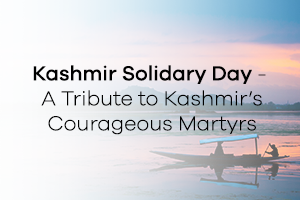Every year on February 5, Pakistan observes Kashmir Day, or Kashmir Solidarity Day, as a public holiday. The purpose of this day is to show Pakistan’s solidarity and support for the citizens of Indian-occupied Kashmir, and their continuous freedom struggle, and paying tribute to Kashmiri martyrs who died fighting for Kashmir’s freedom.
History of Kashmir Solidarity Day
In 1990, Qazi Hussain Ahmad of Jamat-e-Islami Pakistan proposed Kashmir Day for the first time. Nawaz Sharif, Pakistan’s then-Prime Minister, planned a “Kashmir Solidarity Day Strike” in 1991. Nawaz Sharif had come to power with the Jamaat’s assistance the previous year. So the event of Kashmir Day in 1991 was also a Jamaat affair.
However, the current ‘Kashmir Solidarity/Support Day’ was established in 2004 by Pakistan’s Minister for Kashmir Affairs & Northern Areas.
What is the Kashmir Conflict?
The beautiful valley of Kashmir is referred to as “heaven on earth.” It is a place that everyone should visit at least once in their lifetime. In addition, Kashmir has become one of the most popular tourist destinations in Pakistan.
It is breathtakingly beautiful and a place that you should visit. However, unfortunately, since 1947, it has been plagued by territorial disputes.
The liberation of Kashmir has been a source of conflict between India and Pakistan since the partition of the subcontinent. And with each passing year, the dispute between the two nations worsens.
After the British rulers decided to call it quits and return to their homeland, the Indian subcontinent was divided in 1947. All parties agreed that Pakistan would include the Muslim-populated portions of the Indian Subcontinent. And India would retain the rest of the subcontinent.
However, Lord Mountbatten and the Indian government of the time conspired against Pakistan. And India forcibly took control of what is now known as “occupied Kashmir.” The first of three wars in the region was fought between Pakistan and India.
The Kashmiri citizens decided to become an independent state. However, India did not accept their decision and claimed that Kashmir is a part of India. Kashmiris and Pakistanis did not acknowledge the Indian government’s decision.
It led to a tragic war and thousands of Kashmiris lost their lives for freedom. To this day, the Kashmir conflict is one of the major issues between the two countries.
The Cease-Fire in 1949
The United Nations’ intervention resulted in a cease-fire that went into effect in January 1949 after localized warfare lasted throughout 1948. In July of that year, India and Pakistan established the line of control, a cease-fire line that separated control of the region. The divide along that line, which was seen as a temporary measure at the time, still exists.
So, to honour the sacrifices and struggles of Kashmiri citizens who lost their lives fighting for freedom, Pakistan celebrates Kashmir Day every year.
How is Kashmir Solidarity Day Celebrated?
There are ways in which we observe this day in Pakistan. There are protests, rallies, and religious ceremonies. For decades, the Kashmiri liberation movement has attracted attention to the issue. Many parties put together processions, rallies, conferences, and seminars to spread awareness of the conflict in Kashmir.
Our leaders and activists support a peaceful resolution to the Kashmir conflict. Rallies and prolonged marches are organized by politicians, religious groups, and other groups. Slogans are shouted in support of the Kashmiri freedom movement and to express support for the Kashmiri people.
The day is also observed as a national holiday, and the national flag is flown at half-mast as a symbol of mourning for the victims of the conflict. The main events are held in the capital, Islamabad, and other major cities across the country.
The Pakistani government arranges official events, such as flag-hoisting ceremonies and ceremonies to pay homage to Kashmiri martyrs.
In addition, the Pakistani government also holds official events to express solidarity with the people of Kashmir and to raise awareness about the issue. In addition, media outlets may run special coverage and programs to highlight the plight of the Kashmiri people.
Political leaders from different political and religious parties give speeches to express their support for the Kashmiri people. They demand an end to the human rights violations committed by Indian forces in the region.
Mosques and religious centers hold special prayers and Quran recitations for the welfare of the Kashmiri people and for peace in the region. So, as Pakistanis, we support and commemorate the sacrifices of Kashmiris martyrs in every way possible.
However, in the end, I would like to say that despite the atrocities, India has been unable to shatter the Kashmiris’ spirit of independence and love for Pakistan.
